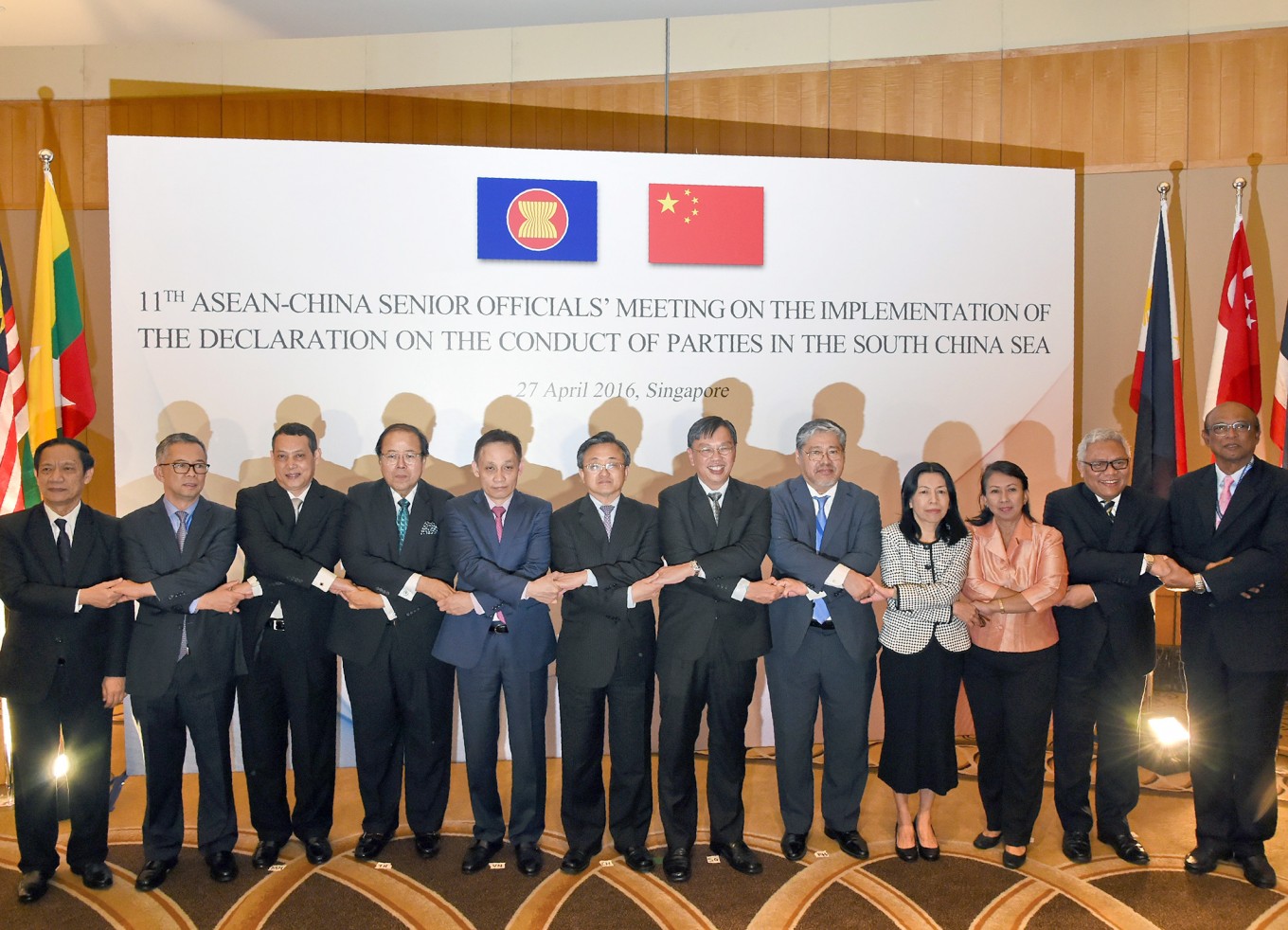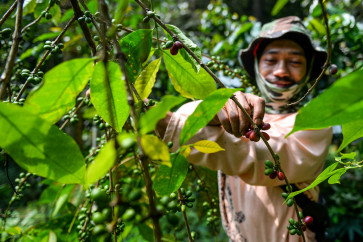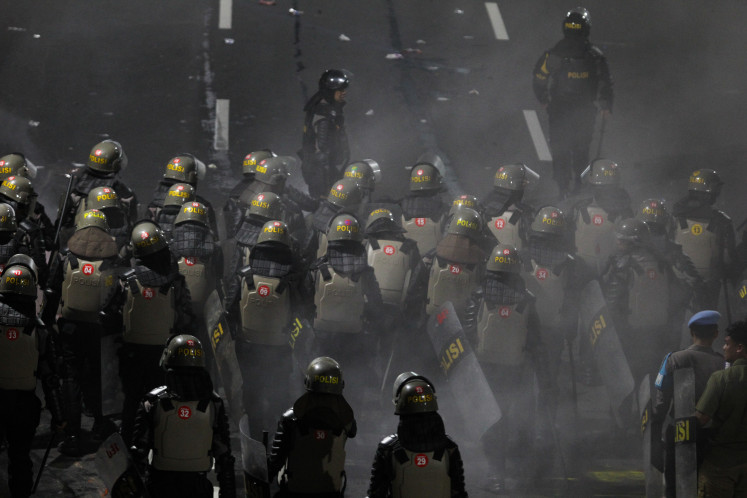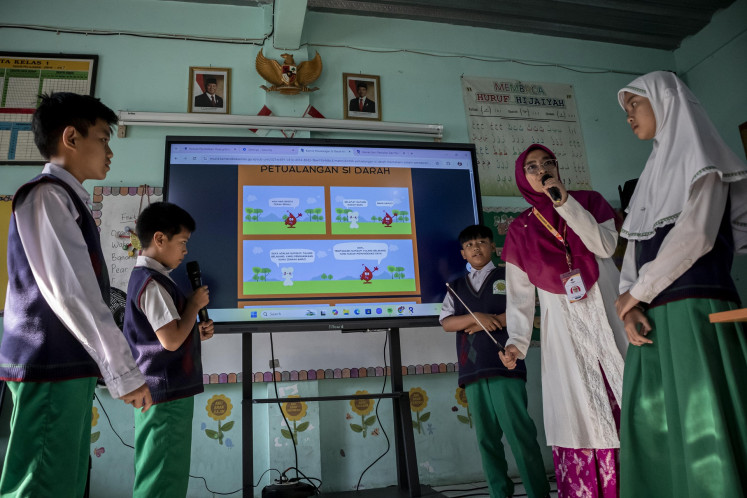Toward a code of conduct on the South China Sea
Indonesia should equally make the best possible use of Beijing’s acknowledgement of Indonesia’s economic centrality in Southeast Asia and its growing influence in international forums, as well as its global maritime fulcrum as a crucial pedestal for China’s maritime silk road. After the recent incidents near the Natuna Islands, China has ceased being vague about its position toward Indonesia. These confrontations should convince Indonesia to again take the initiative and come up with a new version of a code of conduct on the South China Sea.
Change text size
Gift Premium Articles
to Anyone
 Joint Press Briefing 11th ASEAN-China Senior Officials’ Meeting on the Implementation of the Declaration on the Conduct of Parties in the South China Sea (SOM-DOC) and 22nd ASEAN-China Senior Officials’ Consultations (ACSOC) (Exclusive/Asean.org)
Joint Press Briefing 11th ASEAN-China Senior Officials’ Meeting on the Implementation of the Declaration on the Conduct of Parties in the South China Sea (SOM-DOC) and 22nd ASEAN-China Senior Officials’ Consultations (ACSOC) (Exclusive/Asean.org)
I
t was at the 29th ASEAN Ministerial Meeting in Jakarta on July 20 and 21, 1996, when ASEAN endorsed the idea of determining a regional code of conduct on the South China Sea (SCS) “which will lay the foundation for long-term stability in the area and foster understanding among claimant countries.” ASEAN’s foreign ministers accentuated the importance of freedom of navigation and aviation on the South China Sea.
In 1999, ASEAN approached China to start negotiations on a code of conduct (CoC) for the South China Sea. However, after negotiating for five years no agreement on a CoC between ASEAN and China was achieved.
At China’s insistence, ASEAN and China agreed upon the Declaration on a Conduct of Parties in the South China Sea (DOC). It has three objectives: to promote confidence-building measures, to foster cooperation in maritime affairs and to prepare a formal and binding code of conduct.
In paragraph 10 of the DOC both parties agreed that “Adoption of a code of conduct in the South China Sea would further promote peace and stability in the region and [they] agree to work, on the basis of consensus, toward the eventual attainment of this objective.”
However, the core of the problem between the two sides is precisely the formulation of the code of conduct.
China has never agreed to the principle that the members of ASEAN will continue their practice of consulting amongst themselves first before meeting China on the issue, as in China’s view the problem in the SCS does not involve all ASEAN countries. It will only negotiate on the SCS issue with the relevant individual parties, not with ASEAN as a whole.
It is here that ASEAN will have to disregard China’s demand. Chapter 1, Article 1, paragraph 15 of the ASEAN Charter stipulates that ASEAN has “to maintain the centrality and proactive role of ASEAN as the primary driving force in its relations and cooperation with its external partners in a regional architecture that is open, transparent and inclusive”.
It is on the basis of this principle that ASEAN will have to formulate a code of conduct for the South China Sea and Indonesia will have to take the initiative while in the process rebuilding ASEAN’s cohesion to achieve that goal.
The recent imbroglio in Indonesia’s exclusive economic zone (EEZ) around the Natuna Islands has convinced Indonesian authorities, up to President Joko “Jokowi” Widodo, that China’s nine-dash line includes the Natuna Islands’ surrounding seas, which is evident from the various photographs and maps in China’s newspapers highlighting the event and from the captured fishing vessels.
This is obviously a competition for jurisdiction and sovereign rights in areas of overlapping maritime claims. Indonesia does not acknowledge the nine-dash line and its actions in its EEZ are fully justified.
China, however, claims that the fishing incident occurred within its nine-dash line, its traditional fishing grounds, 133 kilometers away from the Natuna Islands, which it said was definitely outside Indonesia’s territorial maritime zone and is only Indonesia’s EEZ.
The Chinese side argued that according to UNCLOS this area is also within the Chinese EEZ. Nonetheless, China said it believed that the fisheries issue would not exacerbate security in the SCS.
However, the recent ASEAN-China meeting to prepare for the 25th anniversary of ASEAN-China relations (September 2016 ) ended in disarray precisely because of the tensions in the South China Sea.
The recent and ongoing developments in the SCS, in ASEAN eyes “have eroded trust and confidence, increased tensions and which may have the potential to undermine peace, security and stability” in the area.
These incidents and the various maps indicating Chinese fishing grounds deep inside Indonesia’s EEZ and territorial waters found on the Chinese fishing vessels detained by the Indonesia navy incited President Jokowi to ask after being shown the maps: “What is it they want?” They make it difficult for Indonesia now to further act as an honest broker in the South China Sea enmeshment.
The government, in determining its official stance on the South China Sea, should henceforth assess the Chinese government’s standpoint on the waters around Natuna.
This consideration should be Indonesia’s basic stance in formulating a code of conduct in the South China Sea irrespective of Indonesia’s “foreign policy priority”, which puts a high significance on political economy, specifically emphasizing foreign investments and infrastructure assistance projects from China, Indonesia’s main engine of economic growth.
Indonesia should equally make the best possible use of Beijing’s acknowledgement of Indonesia’s economic centrality in Southeast Asia and its growing influence in international forums, as well as its global maritime fulcrum as a crucial pedestal for China’s maritime silk road.
After the recent incidents near the Natuna Islands, China has ceased being vague about its position toward Indonesia.
These confrontations should convince Indonesia to again take the initiative and come up with a new version of a code of conduct on the South China Sea.
In this version emphasis should again be put on the Treaty of Amity and Cooperation as an instrument of managing and resolving the recurring issues in the SCS to the point of applying Article 17 TAC, which is “recourse to the modes of peaceful settlement contained in Article 33(l) of the Charter of the United Nations”.
China’s nine-dash line will be ignored by the International Arbitral Tribunal and this will thus have to be incorporated into Indonesia’s and ASEAN’s stance of not recognizing the imagery line.
Consequently, a commitment should be given to build the SCS as a “peaceful area and for peaceful purposes” only, in accordance with the 1982 UNCLOS.
Next, the joint development of resources in areas of overlapping claims in the SCS should be agreed upon by the parties concerned prior to the actual implementation, whether bilaterally or multilaterally.
Similarly, unilateral action should be avoided in disputed areas as it would hinder the attainment of any agreement, such as for exploration for hydrocarbons.
Most importantly, however, Foreign Minister Retno LP Marsudi should visit and talk to her colleagues in the ASEAN member countries to try to rekindle ASEAN’s solidarity and centrality to approach the South China Sea issue in the spirit of Indonesia’s basic stance in Aug. 16, 1966, to create an “integrated” Southeast Asia to be able “to face any influence or intervention from abroad, both economically as well as militarily.
“A Southeast Asia that cooperates, a Southeast Asia that is integrated is a very strong fortress and base to face imperialism and colonialism in any form and from anywhere.”
***
The writer is a senior researcher at the Center for Political Studies, Indonesian Institute of Sciences (LIPI), Jakarta.
---------------
We are looking for information, opinions, and in-depth analysis from experts or scholars in a variety of fields. We choose articles based on facts or opinions about general news, as well as quality analysis and commentary about Indonesia or international events. Send your piece to community@jakpost.com.








